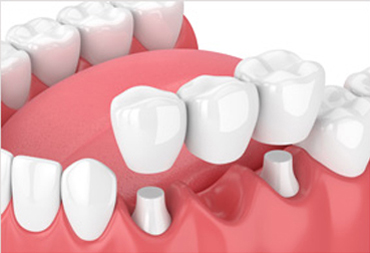Dental crowns and tooth bridges
What is the difference between a crown and a bridge?
There are a lot of different options to restore and replace teeth. Depending on your specific dental needs, your dentist may recommend a dental crown or bridge to help improve your smile for the world to see!
A dental crown, sometimes referred to as a cap, is often indicated to help restore a damaged tooth that is no longer strong enough to function properly. Dental crowns are also used on dental implants, which serve to replace a missing tooth.

A dental bridge is also designed to replace one or more missing teeth. This restoration commonly involves preparing two natural teeth for dental crowns or using dental implant crowns connected by an artificial tooth in the middle where a tooth was lost.
Both dental crowns and bridges can help restore your smile in terms of function and beauty.
How do crowns work?
Crowns help maintain the quality of your chewing, speech, and appearance. Teeth that have been damaged or weakened as a result of trauma, tooth decay, or other oral conditions can be restored with a crown to help prevent further damage and possible tooth loss. Your dentist will recommend which type of crown is best in your particular case. Once decided on the crown material, your dentist will remove any existing decay or unsupported tooth structure and prepare your tooth for the crown under dental anesthetic. Then, your dentist will take a mold or impression of your mouth to be used for fabrication of the crown. Some offices have same day crown procedures, whereas some crowns may be sent to a lab and delivered at a future date. If the latter situation is the case, a temporary crown will be placed in the meantime.
Different types of crowns available
There are several different types of materials that can make up a dental crown. Your dentist can help you choose the best fit for you. In general, there are 5 different types of crowns:
1. Porcelain-Veneered Zirconia:
Crowns made from this material are becoming increasingly popular for their natural appearance, strength, and relatively low cost. However, porcelain may have a tendency to fracture.
2. All Ceramic-Porcelain:
Ceramic crowns also appear to resemble natural teeth, however can be prone to fracture in comparison to other crown materials like metal-based crowns. As a result, they are typically not recommended for teeth towards the back of the mouth.
3. Porcelain-Fused-to-Metal (PFM):
PFM crowns are known for their strength and aesthetics. However, the porcelain may still be prone to chipping.
4. Gold Alloys:
Gold is one of the strongest crown materials, but can be costly and not resemble natural tooth structure.
5. Base-Metal Alloys:
In addition to gold alloys, base-metal alloys are one of the strongest crown materials and are gentle on neighboring teeth. This material is also known to be resistant to corrosion and does not necessitate significant removal of tooth structure during preparation for the crown. Yet, this option tends to be more costly and does not resemble natural tooth structure.
How do bridges work?
Bridges are prepared similarly to dental crowns. The teeth or dental implants neighboring the area of tooth loss will be prepared for dental crowns. When the crowns are made, an artificial replacement tooth (known as a pontic) will be joined to the crowns and will fill the space of the missing tooth/teeth.
Different types of bridges available
1. Traditional Dental Bridges:
Traditional dental bridges are commonly made from an all-ceramic or porcelain fused to metal (PFM) material. This restoration requires tooth enamel removal from the teeth directly next to your missing teeth for crown preparation.
2. Cantilever Bridges:
Cantilever bridges are more conservative than traditional dental bridges because only one tooth adjacent to the missing tooth is prepared for a crown and attached to the artificial pontic tooth. As a result of the pontic only attaching to one tooth, the cantilever bridge is often subject to more complications such as loosening and fracture.
3. Maryland Bridges:
Maryland bridges conserve tooth structure by not requiring the adjacent teeth to be prepared as crowns. Instead, thin metal or porcelain wings connected to an artificial pontic tooth are bonded to the backs of the adjacent teeth using a dental filling material. Maryland bridges are typically used to replace teeth missing in the front of the mouth because they are not as durable as traditional bridges.
4. Implant-Supported Bridges:
Dental bridges can also be supported by dental implants. Implant-supported bridges are often recommended when more than one missing tooth needs to be replaced. The number of implants used will depend on your specific oral condition.
What are the benefits of dental crowns and tooth bridges?
Dental crowns and bridges can offer great benefits to your smile. Dental crowns help replace lost tooth structure, increase the survival of weakened teeth, and improve the appearance of misshaped or discolored teeth. Dental bridges and implant crowns help to replace missing teeth and improve your chewing, speaking, and appearance of your smile.
How long do crowns and bridges last?
Just like your natural teeth, crowns and bridges require good oral hygiene to stay healthy. On average, dental crowns and bridges have been reported to last around 5-7 years, but may last longer than 10 years with proper care. It will be important to brush and floss daily. Your dentist will check the stability and health of your restorations at your regular check-up appointments. Dental issues like decay and gum disease can impact your crowns or bridges. In addition, chewing hard foods or habits like tooth grinding can sometimes dislodge these restorations.
How much does getting a dental crown or tooth bridge cost?
The cost of dental crowns and bridges can vary at different offices depending on a number of factors. On average, a dental crown may range between $1000 and $3,500, according to the Consumer Guide to Dentistry. Dental bridges on average may range between $3,000 and $5,000. Speak with your dental professionals to see about possible coverage from dental insurance.
Our doctors and dental specialists provide a wide range of dental services at our 40+ multi-specialty dental offices across Massachusetts and New Hampshire. Our dental team is compassionate, and our main goal is to provide you a comfortable, caring dental experience. Book an appointment at your local Gentle Dental today.



